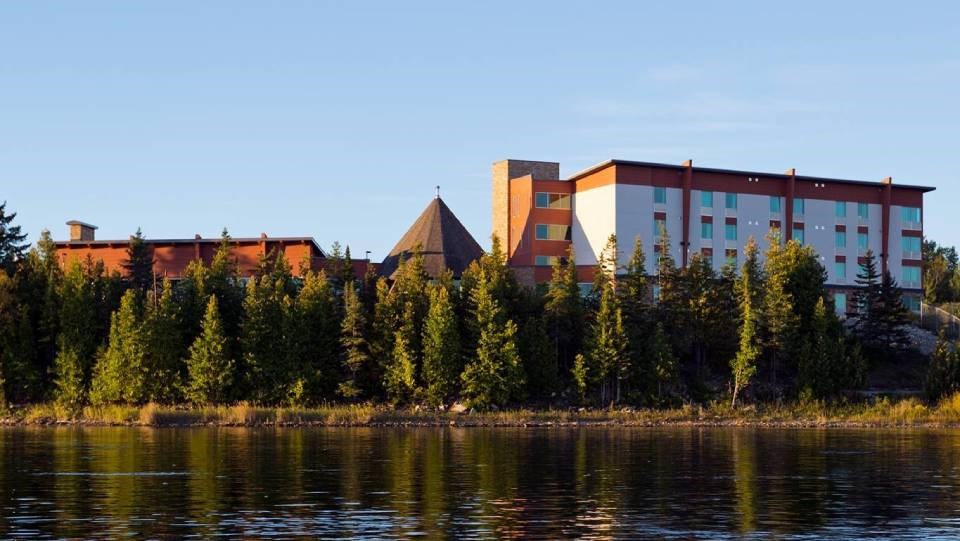For nearly five years, Corey Stacinski has worked at the Manitoulin Hotel & Conference Centre as general manager, but early on in the pandemic, he found himself playing a new role: detective.
As the province introduced sweeping shutdowns in an effort to mitigate damage wreaked by COVID-19, large swaths of the Little Current hotel’s business disappeared.
Gone were the business meetings, conferences, and conventions. Traffic from vacationing tourists dried up. No one booked a wedding. Even the popular restaurant, which specializes in Indigenous cuisine, had to close because it couldn’t abide new capacity restrictions.
Much of the hotel staff had to be laid off and there were weeks that Stacinski wasn’t sure he would be able to make payroll.
“There were four weeks there where we were really, really close. And we had as little as nine staff on the payroll,” Stacinski said. “We were cutting where we could, but at the end of the day, our industry and our hotel relies on staff.... It’s a people business, and we need the workforce. We need to keep them safe.”
That’s where Stacinski’s sleuthing skills came into play.
Essential workers still needed a place to stay, he reasoned, and he was determined to position the hotel as the go-to accommodation for those workers, who were still travelling to Manitoulin Island in order to complete priority projects.
Although that put the hotel at odds with some of the local residents, who wanted to discourage travel to Manitoulin, Stacinski decided the risk was warranted.
“One of the things that really helped us keep our lights on during the start of the pandemic was these essential travellers, and the construction that was building the new OPP station,” he said of the $20-million project, which began in 2019 and has since been completed.
Stacinski became a regular attendee at the local council meetings, which were being held virtually at the time, to learn which companies were awarded contracts for the OPP project and others that came after it.
As soon as the tenders were issued, Stacinski would send the contractor an email, first congratulating them on winning the contract, and then introducing himself and the hotel, listing their amenities and the measures they had put in place to keep guests healthy and safe.
It worked.
“We weren’t killing it by any means in those early months, but that’s what was keeping our doors open,” Stacinski said.
Want to read more stories about business in the North? Subscribe to our free newsletter.
Upon opening in 2013, the $12.5-million facility was heralded as the first new hotel to be built in a century on Manitoulin Island.
Equipped with 58 guestrooms, conference rooms, a pool and a restaurant, nothing on the island, located about 90 minutes west of Sudbury, matches it in scope.
Starting out as the vision of the Great Spirit Circle Trail (GSCT), a former Indigenous-led tourism outfit, the project eventually got buy-in from six of the area's First Nations: Aundeck Omni Kaning, M’Chigeeng, Sagamok, Sheshegwaning, Whitefish River, and Wiikwemikoong.
It’s main clientele has comprised Indigenous conferences and tourist groups, so when COVID arrived and put all that into disarray, Stacinksi feared the worst.
“We basically have 90 days in the summer – June, July, August – to make our revenue and then the rest of the year to try and hold on to as much of that as we can,” Stacinski said.
It turns out he needn’t have worried.
Thanks to those essential workers and a resurgence of tourist traffic this past summer, the hotel had record-breaking years for revenue generation in both 2020 and 2021, a milestone that surprised the hotel manager.
“Had you asked me in 2019 could this hotel survive without conferences, without group business, without bus tours, I would have said absolutely not,” Stacinksi said.
“It’s at least forced me to reevaluate what I thought.”
With the pandemic ongoing, Stacinski and the hotel’s board of directors are now trying to consider its future.
It will take some time to build back the clientele, he noted, especially the international travellers that arrived from Europe and Asia to participate in group tours.
Part of Stacinski’s strategy is to encourage guests to schedule more of their events and visits during the shoulder seasons when the island is less congested and the hotel’s rates are more favourable.
“Everybody wants to be here in July and August because it’s beautiful, but we have quite nice falls,” he said.
“A lot of our core clientele have bought into that and they’ve seen the savings they can get by moving the conference a month here, a month there into our shoulder seasons, so that has helped.”
Staffing is at a critically low level, and many of those who had been laid off over the last two years have not returned, instead seeking out opportunities with organizations that have been permitted to continue operating.
Stacinski is worried that COVID’s lingering presence will leave an entire generation of hospitality workers without the proper soft skills to excel at customer service.
But the hotel is also undertaking its first strategic plan, and one of the ideas being floated involves incorporating an education component into its operations.
This might involve partnering with various postsecondary educational institutions to host hands-on training and placement opportunities for students interested in the tourism and hospitality sectors.
Graduates could find a position with the hotel, he noted, or even open their own tourism-related business.
“Even if we were to train someone and they were to go and open a food truck or a restaurant in Gore Bay or M’Chigeeng, or a fat-biking tour operator in Wiikwemkoong, those are going to benefit us in the long run,” Stacinski said.




